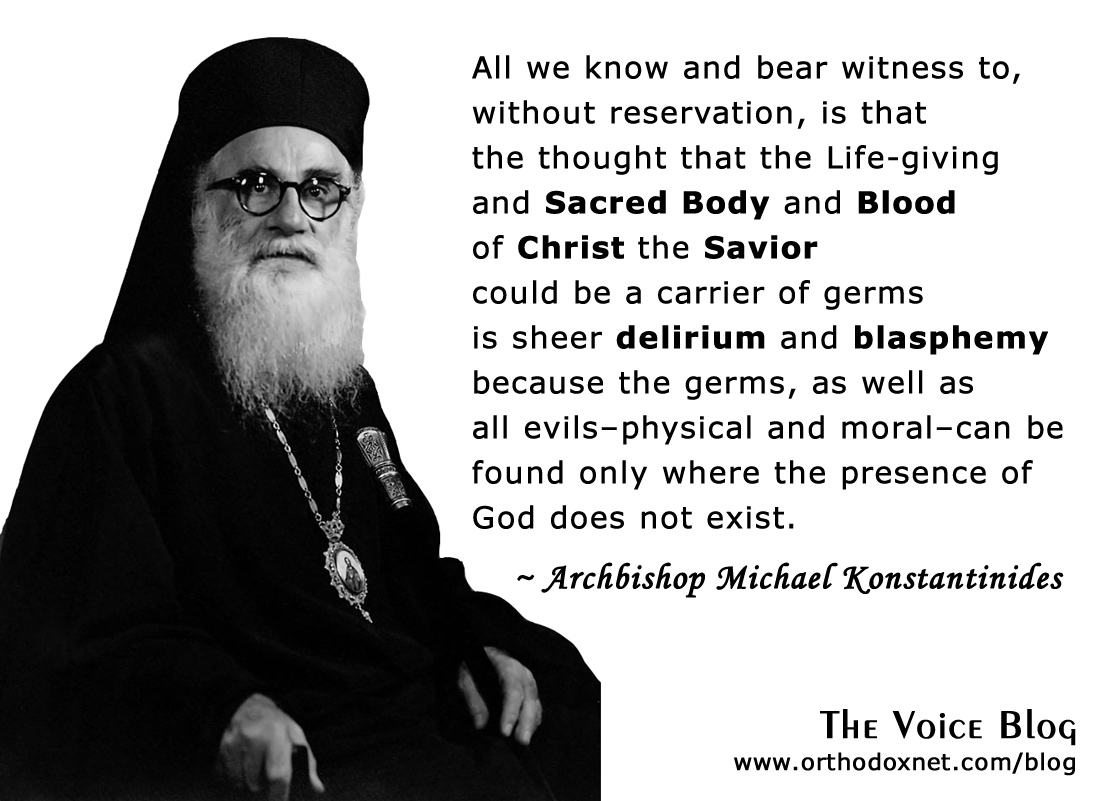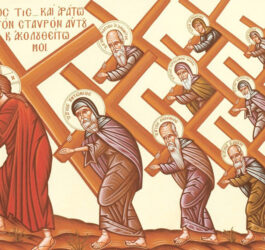 by Archbishop Michael Konstantinides –
by Archbishop Michael Konstantinides –
Consequently, not only is it not, nor could it ever be possible for Holy Communion to be a carrier of germs, but, on the contrary, it is by general rule the carrier of health and life and strength.
The first thing that I would like to emphasize is that the Greek Orthodox Church in America is part of the One, Holy, Catholic and Apostolic Church and an inseparable part of the domain of the Ecumenical Throne (of Constantinople). As such she has no choice but to follow, in all matters of faith and tradition, the Mother Church of Christ, the Great Church of Constantinople, as well as the other parts of the Eastern Orthodox Church.
In all the domains of the Ecumenical Throne, as well as in all other Autocephalous Churches of the Orthodox East, the Holy Communion of the Most Precious Body and Blood of Christ is given to the faithful by a special spoon in both species. The same thing takes place in our Holy Churches in America. Nor could it be otherwise since we constitute a part of the whole Orthodox Church and we must be bound with her in matters of faith and tradition.
Now comes the matter of germs which frightens so many Christians: There should be no question about the fact that it is not possible to speak about germs where the very Body and Blood of our Savior Jesus Christ is present.
Indeed, germs which communicate diseases, as well as the diseases themselves, are the direct consequence of the ancestral sin (the original sin of Adam and Eve). All of nature, according to the teaching of the Church and the words of the Apostle Paul, ‘sighs and suffers,’ because of the ancestral sin. However, where God is present, there cannot exist any pain or suffering or germs or disease.
According to the faith of the Church, Holy Communion physically presents to us very God, Jesus Christ, who was incarnated, sojourned on the earth, was crucified and died and rose. It is Him that we receive when we come to Holy Communion, that is, His Life-giving Body and Blood for the remission of sins and eternal life.
During my service as Chancellor in the Archdiocese of Athens, I came to know priests who offered their services for long years in the “Sotiria” Tuberculosis Sanitarium. All of them communed the patients regularly and then consumed what was left in the Cup, without ever suffering any ill effect. This is because it is impossible for God to be the carrier of destructive germs; on the contrary, receiving Holy Communion restored the strength and health and healing of soul and body to the desperately ill, and rid them of their illness in a miraculous manner. Every priest will recall, from his own priestly experience, miraculous healings of sick people after their contrite confession and the Communion of the Most Precious Body and Blood of Christ.
Consequently, not only is it not, nor could it ever be possible for Holy Communion to be a carrier of germs, but, on the contrary, it is by general rule the carrier of health and life and strength. For this reason, the Fathers of the Church refer to Holy Communion as ‘medicine’. However, one might protest, why is it that this miracle does not happen every time Holy Communion is received? Our answer is that this is a mystery known only to God.
All we know and bear witness to, without reservation, is that the thought that the Life-giving and Sacred Body and Blood of Christ the Savior could be a carrier of germs is sheer delirium and blasphemy because the germs, as well as all evils–physical and moral–can be found only where the presence of God does not exist.
+ Archbishop Michael Konstantinides of North and South America (Greek Archdiocese, October 5, 1953)
__________________
In October 1953, Archbishop Michael of the Greek Orthodox Church of America, wrote a letter to the National Herald (dated October 5, 1953), in order to clarify questions about the allegedly unsanitary nature of Holy Communion. Quotes above are excerpts from the letter.
__________________
Fr. Peter Heers writes on Orthodox Ethos:
“While the opportunity presents itself, let us add this: in accordance it the teachings of the Church and the words of St. Paul, in the 11th Chapter of his First Epistle to the Corinthians, we may suffer for receiving Holy Communion unprepared, that is, without the proper penance and confession. Yes, in that case, the communicant may suffer serious ills. This is what St. Paul has to say as interpreted by Professor Panagiotis Trembelas: “Let every man carefully examine himself and, after he has prepared himself with this examination, let him eat from the consecrated bread and drink from the consecrated cup. Because he who eats and drinks unworthily from the consecrated bread and wine, eats and drinks condemnation and judgement upon himself because he does not discern the body and blood of the Lord but uses them and consumes them as if they were common food. Therefore, because you eat and drink the body and blood of the Lord unworthily, and without examination, that is why many of you are weak and ill and some have died” (1 Cor 11:27-30).
Thus, the conclusion becomes eminently clear. Only the one who partakes unworthily may suffer some ill, and germs cannot exist where God himself is physically present.”
__________________
Chris Banescu:
Who Do We Trust?
Do we trust the truthful teaching, witness, and authority of Our Lord Jesus Christ, the Holy Spirit, the Apostles, the Saints, The Fathers, the Theologians, the Teachers of the Church, and all righteous and faithful shepherds, like Archbishop Michael Konstantinides and millions of other deacons, priests, bishops, and archbishops throughout the entire history of the Orthodox Church?
OR
Do we trust the “authority” of __(fill in the blank)__?



